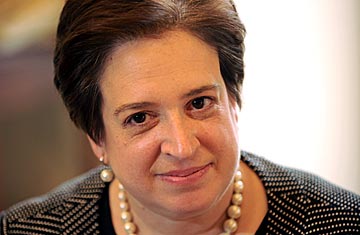
Supreme Court nominee Elena Kagan
(2 of 2)
3. Abortion
The perennial do-they-or-don't-they question that plagues all Supreme Court nominees: Where do they stand on Roe v. Wade? Pro-life groups are crusading against Kagan, whom they perceive to be pro-choice. Their evidence? A memo she wrote under the Clinton Administration that recommended Clinton support a ban on late-term abortions as long as it included an exception to protect women at risk of injury. The White House argues that, again, Kagan was merely providing advice to the President. "The picture that emerges of Kagan is not that of a staffer who presented the President objective information and disinterested analysis but, rather, a staffer who sometimes presented selective and tendentious information and who employed a variety of legal and political arguments to achieve her overriding goal of defeating the legislation," the National Right to Life Committee wrote in a letter to all Senators encouraging them to oppose Kagan.
4. Gay Rights
One of the sure-to-be-big GOP criticisms will be on Kagan's brief barring of military recruiters from her school's offices when she was dean of Harvard Law School. Trying to adhere to Harvard's policy of not allowing recruiters from companies or organizations that discriminate, Kagan was conflicted about how to approach "Don't ask, don't tell," a policy she personally reviled. She briefly restricted recruiters' access to the school's resources office, though she helped them find a back door through veterans' groups. When the federal government threatened to revoke millions of dollars in aid to Harvard, Kagan bowed and allowed the recruiters back in. Republicans have been trying to portray her has anti-military because of her actions, a characterization Democrats have pushed hard against. "Like me, Kagan has never made it a secret that she opposes 'Don't ask, don't tell' — so, by the way, do [Defense] Secretary [Robert] Gates and [Chairman of the Joint Chiefs of Staff] Admiral [Mike] Mullen," wrote Senator John Kerry in an op-ed defending Kagan. "But Elena Kagan's actions as dean don't speak to her political beliefs, they simply reflect current law."
Conversely, on gay marriage Kagan has been more conservative, a concern for liberal groups. During her Solicitor General confirmation hearings she said, "There is no federal constitutional right to same-sex marriage." And when asked about the Defense of Marriage Act, under which states don't have to recognize same-sex marriages performed in other states, Kagan said she would defend the act.
5. Executive Power
Gay rights isn't the only thing worrying liberals about Kagan. After leaving the Clinton Administration, Kagan wrote a paper for Harvard Law Review in 2001 titled "Presidential Administration" in which she argues about the importance of strong Executive Branch control over agencies and regulatory bodies in order for a President to achieve his or her platform, in Clinton's case a progressive one. This argument has been extended, though not by Kagan personally, to apply to foreign policy, particularly Executive powers in detentions, surveillance and interrogation.
But Kagan did, in her confirmation hearings to be Solicitor General, say she believes federal spying laws are constitutional and suggested that only in the rarest of circumstances could a President circumvent Congress to conduct warrantless wiretapping. In those hearings, she was asked by Senator Lindsey Graham if she agreed with Attorney General Eric Holder that any member of an enemy force could be detained without trial, specifically the terrorist detainees being held at Bagram Air Force Base in Afghanistan. "I think that makes sense," Kagan replied, "and I think you're correct that that is the law."
Of course, there are many other issues that are likely to come up, but like with many of the top five, Kagan's response will likely be that she was not espousing her own views but simply doing the job she was hired to do. In a polarized political climate less than five months before an election, it's a case most Republicans aren't likely to buy. The question is whether she's extreme enough for them to filibuster her. "I'm not talking about a filibuster right now," Senator Jeff Sessions, the Judiciary Committee's top Republican, told reporters last week. Which means Kagan's confirmation is more than likely. On the other hand, debating these wedge issues in a high-profile forum may invigorate partisan resistance on each side.
